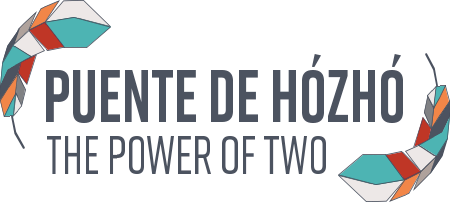International Baccalaureate
Page Navigation
-

Puente de Hózhó Bilingual Magnet School Academic Honesty Policy 2020/2021
Puente de Hózhó's Vision
Is to build a “bridge of beauty” between speakers and learners of Diné (Navajo), Spanish, and English and empower children to be multicultural and multilingual stewards of the world.
Definition of Academic Honesty
Academic honesty at Puente de Hózhó Elementary is defined by the use of one’s own thoughts, ideas, beliefs, and integrity to complete assignments or assessments in any given grade/subject area. Academic Honesty is the foundation of cultivating students that embody the principles which support the mission and values of Puente de Hózhó Elementary School. The expectation is that all students act with integrity while working independently or collaboratively. Students are expected to be committed to the pursuit of excellence in learning with honesty and integrity. All students are expected to uphold the attributes of the IB learner profile in conjunction with academic honesty.
International Baccalaureate definition of Academic Honesty - a “set of values and skills that promote personal integrity and good practice in teaching, learning and assessment. Pieces of work which are based on [the individual's own] original ideas with the ideas and work of others fully acknowledged. ... Those who demonstrate academic honesty are principled.
International Baccalaureate Programme Standards and Practices
Standard B1: Leadership and structure The school’s leadership and administrative structures ensure the implementation of the IB programme(s).
- B1.5 The school develops and implements policies and procedures that support the programme(s).
Standard C3: Teaching and learning Teaching and learning reflects IB philosophy.
- C3.2 Teaching and learning engages students as inquirers and thinkers.
- C3.4 Teaching and learning promotes the understanding and practice of academic honesty.
- C3.5 Teaching and learning supports students to become actively responsible for their own learning.
Knowledgeable: Understand that certain protocols and policies are in place in order to accurately cite sources and collaborate with others
Communicators: Understand that responsibility is shared by individuals in order to collaborate
Principled: Acting with honesty, truth, and dignity; taking responsibility for one’s actions; creating an ethical disposition for writing and speaking; having an expectation of collaborative integrity; and showing respect for one’s own work by acknowledging the work of others
Thinkers: Use critical and creative thinking skills in order to make clear and concise ethical decisions
Reflective: Use of reflection to hold oneself accountable
Self-management: Being organized and making appropriate, ethical choices
Statement of Purpose
This document is designed as a source of information for the students, teachers, staff, and community on Academic Honesty throughout the IB Primary Years Program at Puente de Hózhó Elementary School.
How Academic Honesty Relates to the PYP and the Learner Profile
We promote principled lifelong learning at Puente de Hózhó Elementary School. When students are engaged in inquiry, working on assignments, using technology, communicating ideas and reflecting on learning they demonstrate principled behavior and show integrity. Many of the Learner Profile attributes are embedded in our mission statement and lend support to the importance we place on Academic Honesty. Independence, responsibility, and integrity are integral to promoting world class citizens who respect the work of others.
Role of the Teacher
As elementary school educators, our role consists of raising student awareness of academic honesty and directly guiding students through an exploration of the ethical issue related to academic honesty, including the appropriate use of technology. Academic honesty is particularly important in the area of assessment. It is the responsibility of teachers and staff to guide students to become principled learners whose infractions involving academic honesty lead to support in making better choices in the future. Teachers encourage honest, creative, critical, PYP learning by creating inquiry-based tasks, where creativity is encouraged and where the use of information helps to solve a problem. Depth of knowledge is encouraged by using critical thinking skills for real world problem-solving. Teachers design assessment criteria that value and reward the learning process, rather than simply the result. We teach ways to acknowledge others, and reflect on the learning process. We encourage students to develop and focus on intrinsic motivation for achieving learning goals.
Role of the Student/What We Believe Students Should Do
Students attending Puente de Hózhó are always expected to demonstrate strong moral principles and high ethical standards when engaging in any school activity, be it academic or extracurricular. Our goal is for all students to be able to work independently, with honesty, fairness, and integrity, as they strive to achieve their personal best. Academically, we believe students should demonstrate self management by staying organized, making appropriate choices, demonstrating integrity, and striving to create and present their personal best work. Students are expected to be responsible for their own intellectual thought development and are encouraged to develop creativity in problem solving. Students are introduced to the concepts of plagiarism and are explicitly taught citation skills in the elementary grades; these concepts are reinforced throughout the students’ academic careers. At all times, students should utilize proper documentation and citation to credit the thoughts, ideas, and examples of others. In group settings, each student is expected to take responsibility for contributing individually to the collective process. They should respect other points of view and interact cooperatively with adults and peers. Students are taught to resolve conflict by making social choices that will strengthen interpersonal relationships and facilitate success in school. Through a variety of academic opportunities students will demonstrate the ability to collaborate and lead, and recognize and develop individual strengths. Independent learning time should be used responsibly, respecting the personal learning needs of self and others. Teachers continually reinforce that students must accept the consequences of their personal learning choices and become architects of their own futures. Students are encouraged to create work that is authentic and representative of a unique intellectual pathway.
Academic Honesty and Information Technology
At Puente de Hózhó, technology is utilized to facilitate learning and to support interpersonal communication among all members of our learning community. The use of mobile devices provides access to information, research and collaboration among learners across grades and disciplines. This approach is supported by our district through the provision of a 1:1 ratio of iPad devices in K-12. Teachers and students are expected to model positive online behaviors as they are currently learning in a virtual modality.
Academically Honest students:
- Accurately cite sources when presenting/submitting assignments
- Submit independent and original work
- Use technology as a tool and a resource to craft one’s own thoughts and ideas
Academic Dishonesty includes the usage of ideas, thoughts, and works of a resource and presenting them as your own without giving the aforementioned source credit. This is the definition of plagiarism. It is the act of using or citing someone’s literary work or factual text without permission or proper credit.
- Excluding quotation marks, author’s name, and document information when directly quote a source
- Excluding a bibliography or works cited page
- Not giving credit for the thoughts, ideas and/or work of others
- Copying or paraphrasing someone else’s words or ideas from the internet, books, magazine articles or directly from a person
- Copying or presenting someone else’s work as if it were your own
- Giving your work to another student whether or not you believe it will be copied.
Cheating is the improper or dishonest method in an effort to receive credit for academic work and collusion is assisting someone in the act of being “academically dishonest.”
- Using a classmate’s work as your own
- Attempting to or stealing teacher materials
- Looking on a classmate’s paper
- Allowing a classmate to look at one’s answers
- Using technology to search for solutions to a test/task
- Obtaining information from another student during an examination
- Communicating information to another student during an examination
- Offering another person’s work as one’s own
- Sharing answers for a take-home examination unless specifically authorized by the teacher
- Using unauthorized material during an examination ie. calculator, notes, etc.
- Having another person do the research and/or writing of an assigned paper or report
- Giving your answers to another student
- Letting another student copy your paper
- Completing another student’s work for him or her
Fabrication is using information and academic resources with the intent to deceive.
Possible Penalties
As an elementary program, first and foremost we are concerned with the development of the whole child. Each child is unique, and disciplinary infractions are handled with the whole child in mind, inclusive of their individual circumstances. Ultimately our responsibility in handling infractions involving Academic Honesty is to support a child in making better decisions in the future, and helping the child understand and internalize the importance of Academic Honesty, so their good choices become intrinsically driven. A child who demonstrates a pattern of difficulty in respecting Academic Honesty will be supported through a tiered response of proactive and reactive measures and interventions as part of our Positive Behavior Interventions and Support (PBIS) program, aligned with the Flagstaff Unified School District Student Code of Conduct.
Possible consequences for cheating and plagiarism are not limited to:
- Reviewing the definitions of cheating and plagiarism
- Parent notification
- Requiring students to complete an alternative assignment
- Meeting with principal, teacher and parent
- Receiving no credit or grade for the assignment, project, test or quiz
Conclusion
It is our hope as a community of learners and educators that we are able to successfully convey the importance of academic honesty to our students, and help them realize the goal of learning for its own sake. Our ultimate aim aligns with the PYP Learner Profile: to produce students who show integrity, respect the work of others, and demonstrate personal responsibility in achieving their individual learning goals.

Bibliography
Academic Integrity Policy, International Baccalaureate
Bloomin’ PreSchool, Lone Pine Elementary and West Hills Middle School | Academic Policy_Version_September_2014

